 Picture it: Brazil, early 16th century. You are a Monarch looking to make your mark on the land. Your goal is to advance your struggling empire into future eras, complete goals, and build a prosperous country. Sounds easy right? Not so as your neighboring Monarchs want to claim the land for themselves.
Picture it: Brazil, early 16th century. You are a Monarch looking to make your mark on the land. Your goal is to advance your struggling empire into future eras, complete goals, and build a prosperous country. Sounds easy right? Not so as your neighboring Monarchs want to claim the land for themselves.
Brazil: Imperial is a 4x style game that seeks to combine the explore, expand, exploit, and exterminate experience with a more euro game feel. Published by Portal Games and designed by Zé Mendes, Brazil: Imperial takes about 120 minutes to play.
Gameplay Overview:
At the start of the game, the modular board is set up depending on which map scenario you choose. Each player also gets a unique monarch and matching player board. Monarchs have a unique power, and the player boards are slightly different.
On a player’s turn, they move their action marker on their player board to a new space and take the selected action. Different actions include:
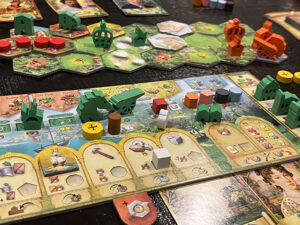
Deploy: Pay resources to place a military unit on the board
Frame: Buy painting cards for special abilities
Build: Construct farms, mines, cities, and other structures to generate resources and earn victory points
Renovate: Refill a production building with resources or convert it to a new type of building
Manufacture: Pay resources to improve one of your basic actions, making it stronger for the rest of the game
Harbor: Gain a small number of basic resources
Trade: Sell resources for gold and special cards
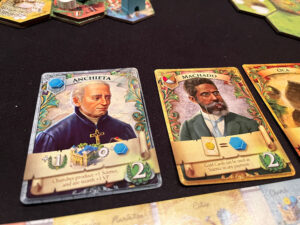
Resources can either be paid from your player board (max 5), or directly from one of your production buildings. Most buildings hold 2 resources of a specific type. Once those are gone, you can refill it with the renovate action.
After a player takes one of those actions, they can move a unit on the board. If the unit moves onto an exploration tile, it’s revealed. If a player moves their units into a hex containing an opponent’s units, combat occurs. Combat is fairly simple, comparing unit strength and any combat cards played.
Then the next player takes their turn. The goal is to complete all the requirements on a mission card, which will advance the game to the next era. Once the era advances, more powerful buildings are unlocked to build. The first player to complete their 3rd era mission ends the game and the player with the most victory points wins.
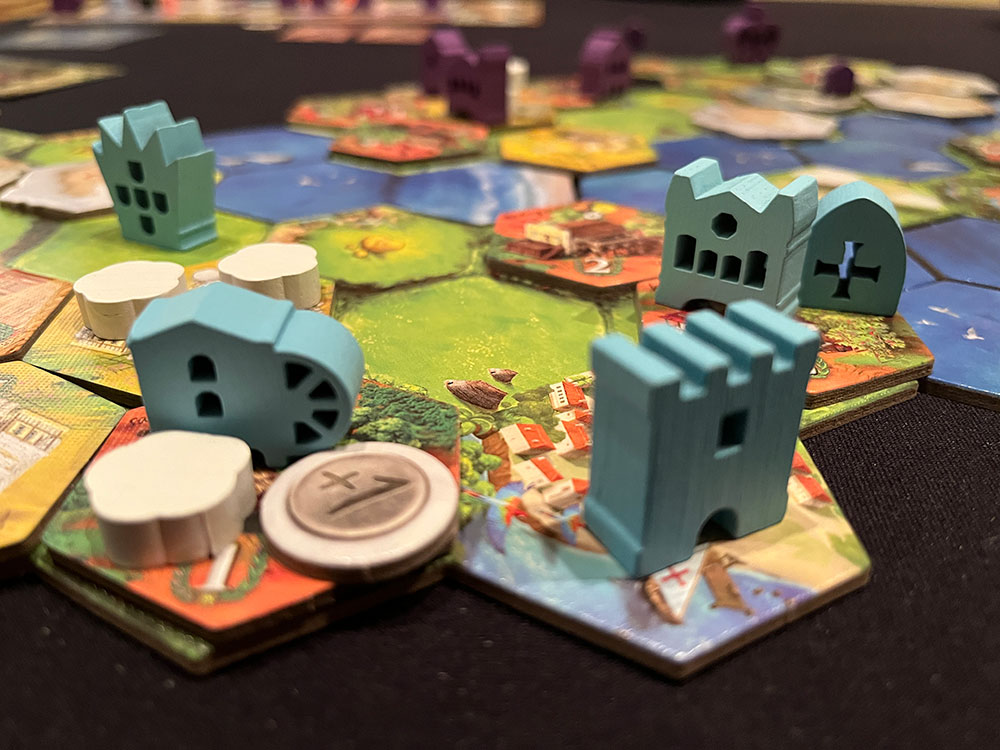
Game Experience:
If you are reading this and thinking to yourself, hey this sounds a bit familiar, you’d be right. Brazil: Imperial is definitely going to draw parallels to the popular game Scythe. From the action selection, to the upgrade mechanic, to even how combat is handled, there are a lot of similarities here. That being said, it’s also not a straight retheme, Brazil: Imperial marches off in its own direction as well.
One thing I didn’t expect is that, at its heart, Brazil: Imperial is a race game. The first to complete their 3rd mission card usually is going to win the game. I’m kind of torn on how I feel about that end-game condition. On one hand, it can make the end game tense and exciting, as you look around and try and figure out who is really close to finishing off their secret mission. Yet, it also makes the 3rd era go by somewhat fast. You just start getting a solid engine going and suddenly the game is over.
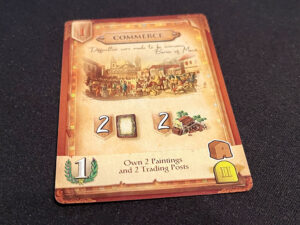
I did like how the monarchs in the game are all unique and pair with a specific player board. Some focus more on war, while others might be science heavy. This helps add some nice replay value as you might want to try out the different factions. That being said, their abilities are somewhat minor, so they don’t change up the gameplay a ton (which does make learning the game easier). I do question if the factions are all balanced, as some feel a little better than others, but I never want to declare that until I’ve played each one many times. Sometimes it just takes a bit to figure out their angle.
My biggest grip with Brazil: Imperial is probably the buildings and the early game. The beginning of the game feels a tad scripted, where you construct a building, use those resources to do another action, renovate, construct, and complete a mission card. Sure, there are some variations here and there, but Era 1 tends to feel a bit on rails. Probably because you only ever start with 1 resource, and most mission cards are: construct X, have X paintings.
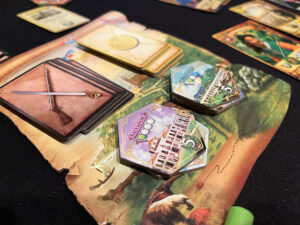
And then there are the buildings, they are just a bit… boring. Most all of them just provide 2 resources. My sugar farm doesn’t really feel any different than my church, other than the color of the token sitting on top of it. And cities just provide victory points (which is the same icon as the combat strength for some reason). This feels a bit like a missed opportunity where buildings could have had a bit of variety or just done something a little more interesting.
But other than that, Brazil: Imperial is a solid 4x game. Although I’d struggle to actually call it a 4x game, more like a 3x. While combat can happen in Brazil: Imperial, I’ve found it to be fairly rare. There usually is enough territory to go around, and players are better off focusing on completing their objects than pestering their opponents. So, if you are a warmonger, this definitely isn’t the 4x game for you. However, if you regularly love multiplayer solitaire euros, this could be the perfect 4x for you. There is the threat of combat, but usually very little of it.
Final Thoughts:
Overall I liked Brazil: Imperial. While there are definitely areas where it could be improved, as a medium-weight, 4x euro game it works nicely. I think it probably plays best at 3-4 players, but I also enjoyed it at 2 and even solo. The art is really well done in the game, and there is even an extra book that dives into the history of the period. Turns in the game go by quickly, so downtime is minimal. And while there are a decent number of rules to learn, once you understand the core gameplay loop, the game should run pretty smoothly. If you are a fan of euros and want to dip your toes into the 4x waters, this is a great place to start.
Final Score: 3.5 Stars – A solid 4x game that should appeal to euro games or those who aren’t a fan of lots of conflict.
 Hits:
Hits:
• Nice art and production values
• Quick turn structure
• Good player scaling
• Combat is minimal for those that don’t like it.
Misses:
• Early game feels a bit scripted
• Buildings are boring
• Combat is minimal for those that like it.




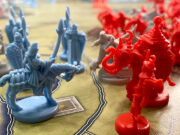
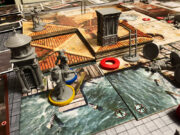
















Thank you for the review!
I’ve been playing with the idea of buying this game for a long time.
Still undecided (although, if I find it at a good price, second hand- I’ll get it).
I feel like the title 4X is too easily thrown into the air. In my opinion 4X games should really give the feeling of all the X’s. One of the best examples I can give is “Uprising: Curse of the Last Emperor”. But even smaller games like “March of the Ants”.
Again, I appreciate your review and thank you very much! Always cool to read your opinion.
Have a good one!
Asaf (EZBoardGames)